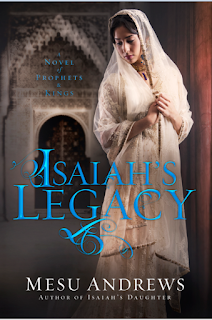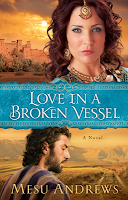Isaiah’s
Legacy continues the story of Judah
Described
as Judah Judah Judah
From sorcery to child sacrifice, this book
really brings to life the reality of pagan worship during biblical times. What
did you learn about some of these practices while writing the book?
Isaiah’s
Legacy
is the tenth book I’ve researched. The nations and generations in those books’
research spans Egypt, Canaan, Phoenicia, Assyria to Babylon (and many nations
in between) and the people I’ve learned about range in time from Jacob in 2005
BC to Daniel in 530 BC—almost 1500 years.
In all
that research, I’ve discovered so many similarities among the foreign gods,
pagan rituals, and sorcery/divining between the nations and regions. But,
interestingly enough, I’ve also discovered that gods and rituals differ from
generation to generation even within the same nation.
A single
god from the same nation may change in name and form from one generation to the
next, but the same basic god may be shared by another nation with a similar
legend and corresponding divine “family.” Nearly every culture includes a
ritual of divining from animal innards. All nations, tribes, and tongues were
fascinated by the various lights in the sky— sun, moon, and stars—and made them
gods with differing names.
Some may
find it disturbing when they discover ancient religions (some dating before
Judaism and our Bible stories) that include stories very similar to Noah’s Ark Land
of Ur Israel ),
and Israel
In every
pagan ritual, every story of foreign gods, every method of divining, there’s a
longing for connection with the Divine. Some want it for selfish reasons or to
use it for evil. Others are looking to fill an emptiness that the Spirit has
revealed—and He’ll lead them to discover the Truth. It’s been this way for
ages, and I believe it will continue until we see Jesus with our own eyes.
You give one of the main characters, Manasseh, a
set of unique characteristics that suggests he is on the autism spectrum. Can
you tell us more about that and why you chose to give him those qualities?
I knew
very little about autism until a couple of years ago, when one of my grandkids
was slow in learning to talk. He would become frustrated in his attempts to
communicate and begin screaming and lashing out. Concerned, I called one of my
author buddies (Pepper Basham), who had also worked as a speech-language
pathologist with specialty in social communication disorders for twenty years.
Stated simply: she had twenty years’ experience of speech therapy with autistic
teens.
After
plying her with questions, I was pretty certain my grandson wasn’t on the spectrum,
but her answers made me wonder about the character I was researching at the
time: the twelve-year-old boy king, Manasseh. Ultra-intelligent, Manasseh could
recite Leviticus fifty-five different ways (Sanh. 103b). (I can’t even recite
all Ten Commandments.)
I wrote
the first twelve chapters, concentrating on Manasseh’s childhood and early
adolescence, and sent it to Pepper and five moms who had adolescent boys on the
spectrum. I asked for their feedback on whether I’d represented this ancient
Judean king correctly—if he had indeed lived with the characteristics of
Asperger’s. One mom, who homeschools all five kids—four of whom are
“Aspies”—went through the entire book, giving feedback on Manasseh’s emotions,
thoughts, and actions.
To ensure
no one would mistakenly believe autism caused Manasseh’s sinful choices, I also
added a “foil” character—someone who is the antithesis of a character to
accentuate certain qualities. A second character shows the same “quirky”
characteristics but is faithful to Yahweh, affectionate, gentle, and kind. My
hope is to raise autism awareness and dispel some of the false fears. I hope Isaiah’s
Legacy can be a novel those in the autistic community can be proud to
share with others.
I'm glad you included the Asperger's characteristics. I have a good friend who has twin boys with Asperger's. I've enjoyed seeong them grow and develop into teenagers. Which character in Isaiah’s Legacy do you most identify with?
My current
self identifies with Zibah—older, wiser, struggling to stay relevant with the
ever-increasing younger population. As I grow older, there are more-and-more
younger ones who think differently than me and less-and-less my age who are
willing to patiently teach them.
My younger
self identifies with Shulle—confused about the real God and which adult’s
theology to believe. I grew up as a spiritual mutt. Dad was Quaker. Mom,
Charismatic. Grandparents, Pilgrim Holiness turned Nazarene turned Wesleyan.
Sheesh! Each family member picked out a few Bible verses to prove their
respective doctrines, and I didn’t know what to believe! So I didn’t believe.
Praise Jesus that He doesn’t give up on prodigals!
What can you tell us about what you’re working
on next?
The
project sticks with my brand of a well-known Old Testament male character with
a lesser-known female. Not sure yet if it will be two or three books on…drum
roll…Joseph! I LOVE Joseph, and I’d love to explore some of the women in his
life: his sister-mothers: Rachel and Leah; his only sister, Dinah; Potiphar’s
Wife, Zelicha; and Joseph’s Egyptian wife, Asenath. I hope to announce the
official future projects in January!
Mesu, the next project sounds as interesting to
me as this one. Be sure to let me know when it will release. And thank you for
sharing Isaiah’s Legacy with us
today.
Readers, here are links
to the book.
Isaiah's Legacy - Christianbook.comIsaiah's Legacy: A Novel of Prophets and Kings
Isaiah's Legacy: A Novel of Prophets and Kings
Isaiah's Legacy: A Novel of Prophets and Kings - Audio Book
Leave a
comment for a chance to win a free copy of the book. You must follow these
instructions to be in the drawing. Please tell us where you live, at least
the state or territory or country if outside North America .
(Comments containing links may be subject to removal by blog owner.)
Void where
prohibited; the odds of winning depend on the number of entrants. Entering the
giveaway is considered a confirmation of eligibility on behalf of the enterer
in accord with these rules and any pertaining local/federal/international laws.
The only notification you’ll receive is the winner post on this blog. So be sure to check back a week from Saturday to see if you won. You will have 4 weeks from the posting of the winners to claim your book.
If you’re
reading this on Goodreads, Feedblitz, Facebook, Twitter, Linkedin, or Amazon, please
come to the blog to leave your comment if you want to be included in the
drawing. Here’s a link:











